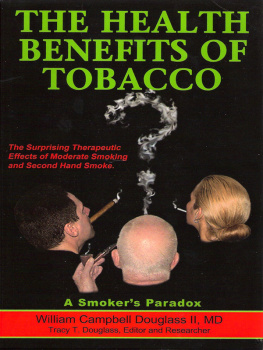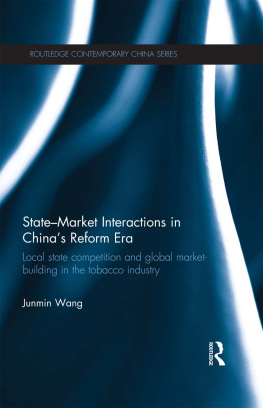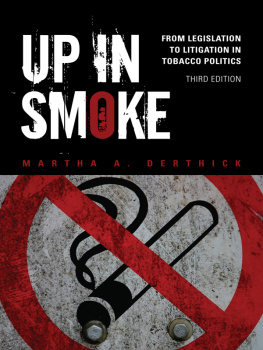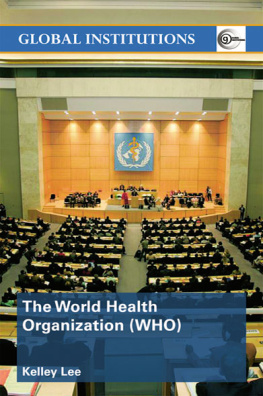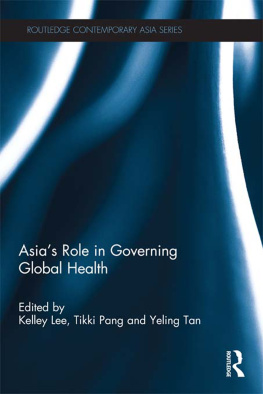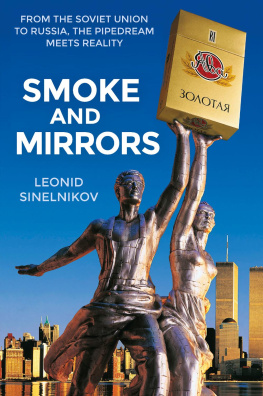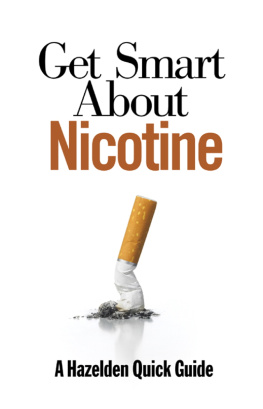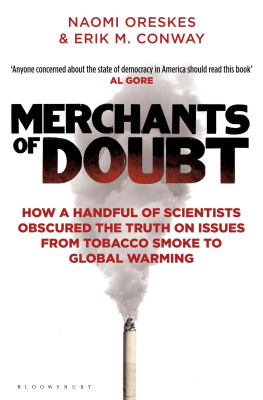The Global War on Tobacco
The Global War on Tobacco
Mapping the Worlds First Public Health Treaty
HEATHER WIPFLI

2015 Johns Hopkins University Press
All rights reserved. Published 2015
Printed in the United States of America on acid-free paper
2 4 6 8 9 7 5 3 1
Johns Hopkins University Press
2715 North Charles Street
Baltimore, Maryland 21218-4363
www.press.jhu.edu
Library of Congress Cataloging-in-Publication Data
Wipfli, Heather, 1976, author.
The global war on tobacco : mapping the worlds first public health treaty / Heather Wipfli.
p. ; cm.
Includes bibliographical references and index.
ISBN 978-1-4214-1683-0 (pbk. : alk. paper) ISBN 1-4214-1683-2 (pbk. : alk. paper) ISBN 978-1-4214-1684-7 (electronic) ISBN 1-4214-1684-0 (electronic)
I. Title.
[DNLM: 1. WHO Framework Convention on Tobacco Control (2003) 2. Smokinglegislation & jurisprudence. 3. International Cooperation. 4. Smokingprevention & control. 5. Tobacco Industrylegislation & jurisprudence. 6. Tobacco Use Disorderprevention & control. WM 33.1]
HD9130.5
338.476797dc23 2014036893
A catalog record for this book is available from the British Library.
Special discounts are available for bulk purchases of this book. For more information, please contact Special Sales at 410-516-6936 or .
Johns Hopkins University Press uses environmentally friendly book materials, including recycled text paper that is composed of at least 30 percent post-consumer waste, whenever possible.
CONTENTS
PREFACE
Few of my childhood memories are as potent as those of sitting on my paternal grandfathers lap as he sat hunch-backed, gasping for air through his oxygen machine. Never one to offer an easy smile, my paternal grandfather was a grumpy, elderly man facing his own physical demisea demise caused by his lifelong addiction to cigarettes. My grandfather was angry. He was angry that his golden years were stolen from him after he had worked hard his entire life, fighting first for his country and then for his family. He was a fervent supporter of tobacco control efforts and detested the tobacco industry with all his heart. His anger and illness transferred these same feelings to his entire family, myself included.
Ironically, another strong memory I have from childhood was when my grandmother bought a small wooden sign to hang in her kitchen that read No Smoking. It was pretty, blue and white, and very unassuming. She mused for days over whether to hang it and whether it was appropriate to ask her guests not to smoke in her houseeven when the presence of smoke could possibly cause her husband respiratory failure. Thirty years later such social concerns seem crazy in the United States. Smoking norms have dramatically changed thanks to the hard work of countless tobacco control leaders in the United States and around the world.
Although I had personal experience with tobacco-caused disease and death (so many of us do), I never anticipated that I would dedicate my career to tobacco control. I set off to study international politics and moved to Geneva, Switzerland, after graduation from college with every intention of practicing global politics. Working within diverse cultures and experiencing our common humanity has always excited me. In my mind, however, international politics was largely limited to war and peace. Just by circumstance, I landed my first internship at the World Health Organization on the Policy Action Coordination team then headed by a rising star named Derek Yach. Derek would later offer me (a starving student) an administrative job with the Tobacco Free Initiative (TFI) assisting with preparations for the first Framework Convention on Tobacco Control (FCTC) working group. The atmosphere in TFI at the time was electrifying. There was a sense that we were breaking the rules of the game and anything was possible. The general approach was to ask for forgiveness rather than permission. I jumped into the work headfirst and quickly became a technical officer on the FCTC team under the leadership of Douglas Bettcher. I remained at TFI for three years while the treaty was negotiated.
That experience gave me an insiders perspective on the FCTC process. Ill never forget the long nights at Genevas International Conference Center, sitting dumbfounded with a handful of the worlds greatest lawyers and trying helplessly to decode the mess of overlapping proposals that the chairs draft had become. I will also never forget the passion and brilliance of so many that made the FCTC a reality.
Tobacco control has a way of sucking people into the work. I left TFI before the negotiations came to a conclusion and moved to the Institute for Global Tobacco Control at the Johns Hopkins Bloomberg School of Public Health, where I served as project director for the next eight years. In this position I was able to observe the FCTC process from afar and take a more academic approach toward its evaluation, including finishing my PhD on the role of diffusion, norms, and governance in global tobacco control.
This book is a culmination of these experiences. I have attempted to remain scholarly and objective in my analysis of the process, although it is safe to say that I am a firm believer in the FCTC process, if for no other reason than its fundamental acknowledgment that global health is political and, at times, requires a political response. In other words, there is a place for people like me in global health. Shortly after I joined TFI full time, and just after I completed my masters degree in international politics at the Graduate Institute of International and Development Studies at the University of Geneva, I was invited out to lunch by a fellow recent alum. He had been hired by an international consulting firm and was working on a contract with a consortium of alcohol companies. They were, in my colleagues words, petrified by the progress of the FCTC and believed that they would be the next target. He admitted to me that he was responsible for collecting intelligence on the process to help them prepare a defense. Sitting here in my office 15 years later, it is shocking to me that alcohol companies have largely been successful in their tactics to avoid similar accountability and forestall global regulation. I hope that this book will help others in global health understand the FCTC process and motivate them to further investigate how international legal instruments can be used for other areas of global health, especially those plagued by unfettered corporate activity and greed.
Of course, a book such as this is not developed in isolation. Evidence and insight for this book came from all corners of the globe and involved countless people from all walks of life. I wish to first thank Jonathan Samet, my primary research collaborator and mentor for nearly 15 years. He has provided me a professional environment that has allowed me to learn and grow, and he has never turned down an opportunity to read and edit my writing. Past and present members of TFI provided feedback on early chapter drafts, and Laurent Huber, director of the Framework Convention Alliance, provided both input and access to images. Menchi Velasco with the Southeast Asian Tobacco Control Alliance helped set up my interviews in Thailand and ensured that I never got out of Thailand without singing karaoke (there is a reason that I write and dont sing). Naowarut Charoenca and Nipapun Kungskulniti of Mahidol University also read and helped edit early chapter drafts. In Germany, Martina Poetschke-Langer and Annette Bornhuser provided crucial information and review. Eduardo Bianco provided in-depth assistance on the Uruguay chapter, and Adrianna Bianco of the Pan-American Health Organization graciously provided versions of her own case study of Uruguay to assist me in writing what is a relatively new story in tobacco control. I also want to thank Shaojun Ma of the China Medical Board and Gonghuan Yang of Peking Union Medical College for answering questions and reading drafts of the China chapter. I owe a very special thank-you to Yinqi Mike Zhang, who served as my primary research assistant and reference manager while I developed the book. This book also would not exist without the support of many individuals at Johns Hopkins University Press, especially Kelley Squazzo for believing in the project and Sara Cleary for her meticulous editing.
Next page

